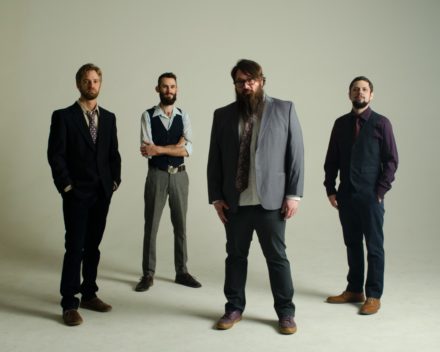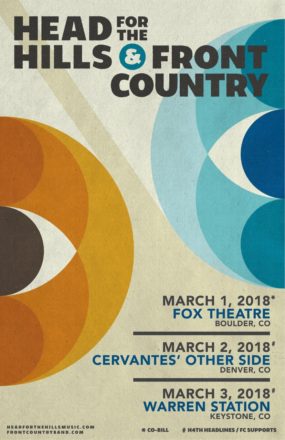A Q&A with Colorado’s Head For The Hills

Head For The Hills
Head For The Hills is one of Colorado’s most innovative bands, of any ilk. Adam Kinghorn, Joe Lessard, Matt Loewen and Sam Parks add fresh elements to bluegrass with the simplest of formulas – connecting with music – pure and simple.
Combining elements of bluegrass, jazz, hip hop, folk and soul, Head For The Hills appeal to traditionalists and the new-grass crowd alike.
Their 2017 album Potions and Poisons showcases an Americana outfit at the top of their songwriting form, with wonderful string arrangements, world influences, and fine pickin’ you are sure to hear extended out live.
They are part of a run with Front Country from March 1 at the Fox Theatre, March 2 and Cervantes, and March 3 at the Warren Station in Keystone.
We had a chance to talk to Joe Lessard, the band’s excellent violin player. He talks about the band’s evolution, his multi-faceted work spanning the genres, and what it’s like to jam out in the gorgeous Colorado mountain air.
Soundcheck: You are one of our state’s finest bluegrass/folk bands. First of all, how does Colorado influence your music?
Joe Lessard: Colorado is a great, supportive place for live music no doubt, and just that has influenced us a lot. The physical environment is very conducive to writing and recording music too, we’ve spent some time at beautiful spots amongst the trees recording albums.
Musically, what are other inspirations? What drew me to the new record is the seemingly Celtic influence – are there roots there in your music?
It’s funny you say that, because it’s not one of the styles we’ve particularly tried to include in our music, but the Celtic/Scottish British Isles flavors do keep finding their way to the surface. In a genetic sense, at least a few of us have it in our blood, so that may be subconsciously influencing us too. And in general, bluegrass has pretty direct connections to that music.
“The hip hop thing has always been a big influence on my lyric writing in Head for the Hills, it informs a lot of the patterns and structures I work with for songwriting.”
You are a bit of hybrid bluegrass band as well – jazz, some hip hop, soul, world music. Where does this come from?
The simplest answer is our record collections and generally varied tastes in music. We’re all coming from different backgrounds musically, but met with bluegrass as a sort of middle ground. It’s been important to us over the years to be true that part of ourselves and make sure that we’re expressing the fact that we’re not a traditional bluegrass band. That’s perhaps what separates us most from other bands in the same space, in a way we feel is positive.
For our listeners who might not have heard your new sounds, what song or two would you point them to.
I would say Afraid of the Dark and Bitter Black Coffee would be great examples of the new sounds, and the departure from straight-forward bluegrass like we were talking about previously.
You’ve played all over. What’s that feeling like being on stage, feeling the energy of the crowd, and getting them to dance from a long jam or pickin’ out a cool solo?
There isn’t really any way to describe that feeling, but it is special when you get to connect with people like that and feel like you’re all working together to create an experience, instead of just playing to an audience.
How does you playing fiddle in Whiskey Blanket affect you play in Head For The Hills?
The hip hop thing has always been a big influence on my lyric writing in Head for the Hills, it informs a lot of the patterns and structures I work with for songwriting, if that makes sense. In regards to the instrumental aspect of Whiskey Blanket, we’ve always highlighted the classical parts of our musical upbringings, so it can be more of a visit to my past playing that material sometimes.
“That bi-coastal or “nocoast” sound is something that I really cherish about our scene, I feel like we’ve tried some things musically just because we felt the freedom to do so, and that idea continues to keep us inspired and excited.”
How has the band evolved over the last 11 years?
Naturally. I’d like to think it’s been a pretty constant evolution over the last decade, but as I’m sure most artists feel, the current version of the band is the one we’re most excited about. I guess maybe I would have said that 11 years ago, haha.
You do a Pickin’ on The Poudre Show in May. What’s in store for this year?
We’ve got a great show planned for this year! We’re going to be adding a few new textures into the mix this year, planning on bringing up a small horn section and a bunch of special guests, to name a few. We’ve also got Wood Belly on the show from right here in Fort Collins, they’re great, and we’ve got Austin-based bluegrass rockers Whiskey Shivers, fresh off their appearance in the latest Pitch Perfect movie. This is gonna be a good one.
What’s it like to literally “pick” on The Poudre?
It’s always magical at the Mish, we’ve been coming to this place and making amazing memories for a decade and a half. If you want to talk real logistics though, that first week of May can be cold and rainy, sometimes even snowy, and it’s amazing how people come and give crazy energy even when the weather is brutal.
What’s on your playlist that is giving you some chills right now?
I just downloaded the self-titled Link Wray album from 1971, and I can’t stop listening to it. I’ve been aware of the guy forever, so I’m wondering how it took me so long to delve into the material. The number of songs on the album that have been licensed to movies is a good indicator of how solid they all are, or it’s just a reminder that Quentin Tarantino shares my taste in music.
What’s on your playlist that your fans would be surprised to know.
I’ve been really into a few albums by the El Michels Affair lately. He’s a really interesting artist and composer who worked for years with Sharon Jones and the Dap Kings and bunch of other interesting acts. I’ve been particularly taken by “Enter the 37th Chamber”, a live reimagining of the Wu-Tang Clan’s classic masterpiece. Check it out if you like anything remotely groovy.
We call ourselves The Colorado Sound, so this seems like an appropriate question – what’s it like to represent the true essence of “the Colorado Sound” – a beautiful folk music representative of where we live?
First of all, thanks! I’d like to think we represent some kind of Colorado Sound, if only because there’s quite a variety within what we do and we don’t feel particularly bound to one stylistic idea. That to me is Colorado, we’re not bound by some of the conventions that east or west coast musicians are just naturally going to feel drawn to. That bi-coastal or “nocoast” sound is something that I really cherish about our scene, I feel like we’ve tried some things musically just because we felt the freedom to do so, and that idea continues to keep us inspired and excited.
Head For Hills will begin their Colorado run March 1 at The Fox Theatre.

